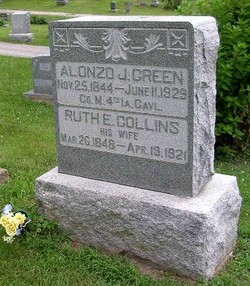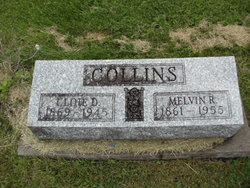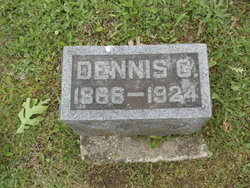| Description |
: |
"Waltus Collins is one of the venerable citizens of Jefferson county. He was born in Simpson county, Kentucky, November 10, 1824, so that his life record has already spanned eighty-seven years. It covers a most interesting period in the history of the country and he can well remember many of the chief evens which have left their impress upon the records of this land. He has himself taken an active part in shaping the development and promoting the welfare of Jefferson county and he can relate many interesting points concerning pioneer history not only in this region but also in...
Read More
|
"Waltus Collins is one of the venerable citizens of Jefferson county. He was born in Simpson county, Kentucky, November 10, 1824, so that his life record has already spanned eighty-seven years. It covers a most interesting period in the history of the country and he can well remember many of the chief evens which have left their impress upon the records of this land. He has himself taken an active part in shaping the development and promoting the welfare of Jefferson county and he can relate many interesting points concerning pioneer history not only in this region but also in Illinois and Kentucky. His parents were Thomas and Polly (Elam) Collins. The father was born in North Carolina, in 1787, and the mother's birth occurred in Virginia, on the bank of the James river, about eight or ten years after the birth of her husband. He was a son of Jasper Collins, who was born in North Carolina and served through the Revolutionary war as a teamster. In the days of peace, however, he followed the occupation of farming. The Elams were a prominent Virginia family and one of the name served in congress. Although reared in North Carolina Thomas Collins was married in Kentucky. In early life he learned the cooper's trade which he always afterward followed, and he also owned a farm which was operated by his sons and their negro assistants. About 1827 the family removed from the state line into Sumner county, Tennessee, and after living there for a time took up their abode in Christian county, Kentucky, where they remained for three years. In the spring of 1836 they arrived in Morgan county, Illinois, and while living there the mother of Waltus Collins passed away, in 1852. The father died later at Pekin, Illinois, when seventy-nine years of age. Their children were eleven in number: Valina, the wife of William Edwards; Olivia, who married Charles Wilson; Thomas Jefferson; James Madison; Mary, the wife of Enoch Frazey; Waltus; Benjamin Franklin; Susan, the wife of William Baldwin; Frances Ann, the wife of William McCasland; Henry Clay, who died at the age of eight years; and Orvil, who served through the Civil war in an Illinois regiment. Waltus and Mrs. Baldwin are the only ones now living. Benjamin Franklin enlisted from Illinois for service in the Civil war and died at the front, near Memphis, Tennessee.
The first incident in his life which Waltus Collins remembers occurred when he was about two years of age, when the family were removing from Kentucky to Tennessee. He can recall the large logs that were used in the building of his father's house and in the other buildings on the premises. While living there he frequently saw General Jackson riding in the stage coach. Following the removal to Christian county, Kentucky, when he was about nine years of age, he witnessed the development of his father's farm into one of the finest tobacco plantations in the world. In the neighborhood lived Peter Cartwright and for a number of years they were neighbors to Jefferson Davis and Buckner. In the same part of the state also lived Lincoln, Clay, and Harlan, together with others who have won state and national prominence. In those early days he and his brother were allowed to hunt rabbits while the older brothers hunted turkey and larger game which was quite plentiful in that district. Corn and tobacco were the chief products raised and Mr. Collins' father frequently sold corn to the slave drivers at fifty cents per bushel. Both the white and black people worked in the fields and Mr. Collins was many days employed by a neighbor when but a young lad. Fox hunting was the favorite sport of the young men of the district and some of the older ones and there were a good many packs of hounds kept in Kentucky. Mr. Collins says that his life was fraught with much pleasure during that period. Corn huskings were among the most interesting social functions of the day and on such occasions a splendid supper was served at which the principal dish was pork pie. When a red ear of corn was found a drink of whiskey was given to the finder, but the owner was usually careful about the disposition of the intoxicant.
Following the removal of the family to Morgan county Mr. Collins spent about eight years of his life in that district. There was no free instruction, the schools being supported by the parents of the children and partly by the state, but later a system of free public instruction was introduced, owing to the rapid settlement of Illinois. When about sixteen years of age Waltus Collins left the parental roof and started out in life for himself, working for farmers for a number of years, including some of the big cattle men and wealthiest stock dealers of the country. While thus employed he first came to know something of the Mormon religion and its followers. Resentment against the Mormons grew stronger as it found that many of the people were desperate characters who committed much theft. In September, 1843, Mr. Collins enlisted in the Illinois State Constabulary, a light horse cavalry, for active duty during the trouble with the Mormons at Nauvoo. There were one hundred mounted men in the brigade, under Captain Thomas Turner and Brigadier General Hardin. Mr. Collins remained in the state service for three years and was the tallest man in his company, standing six feet four inches and weighing about two hundred pounds at that time. He is thoroughly familiar with the history of Mormonism and the movement that ended in transporting the followers of Joseph Smith to the west. The people who had been defrauded would follow their lost property to the edge of the Mormon city but could not recover the stolen goods, and again and again officers with warrants for the recovery of stolen goods would attempt to make an arrest and were never heard of again. At length feeling became so intense against the sect that the Smiths, who were imprisoned in the Carthage jail, were killed by a mob of thousands from Missouri and Illinois. The movement against the Mormons was probably delayed by the political situation, as both parties wanted their votes, but Ford, the democratic candidate governor, won. In September of the same year he called out a brigade of soldiers to quell a mob composed of desperate men from Missouri and Illinois, men who had suffered great loss of property through the Mormons. Governor Ford had as his advisers Stephen A. Douglas and Hardin who counseled a diplomatic course. But at length it was seen that the movement against the Mormons was so strong that they feared a massacre and finally agreed to leave this part of the country. The governor detailed two companies to remain at Carthage and maintain peace. One of these, commanded by Captain Turner, was the cavalry company to which Mr. Collins belonged and the other company was composed of Quincy riflemen, under Captain Morgan. Mr. Collins says that his experience in the constabulary service among the Mormons convinced him that they were the worst body of men he has ever had anything to do with.
At length, when he was discharged from service he came to Iowa, reaching Jefferson county March 20, 1846, and here he has since lived. He made the journey on horseback to join his sister, Mrs. Valina Edwards, who resided in what is now Buchanan township. With her he had spent the winter of 1843-4 and then returned to Illinois, but came here to reside permanently in 1846. He entered eighty acres of land in Buchanan township and resided on it for nine years, after which he sold out and in February, 1857, purchased his present farm, containing one hundred and one acres in Lockridge township, a mile northeast of Salina. It was mostly covered by heavy timber although thirty acres had been cleared and cultivated. The fertility of the ground, however, had been so reduced that it could yield only thirty bushels to the acre. But Mr. Collins planted it to grass and kept his stock thereon, and after a few years its productiveness had so increased that he could raise from seventy-five to one hundred bushels per acre. On his first farm he built a log house with a shingle roof and glass windows. The cabins of those days were mostly built with round logs and clapboard roofs. Splitting a puncheon and hewing it until it was thin, he made a settee upon which he put rockers and used this for the baby's cradle. All the necessary farm buildings were built of logs and covered with clapboards. Mr. Collins availed himself of the wide range for cattle and as the years passed his efforts at farming and stock-raising brought him substantial profit.
As a companion and helpmate for life's journey Mr. Collins chose Jane Chilcott whom he wedded June 11, 1846. She was born in Huntington county, Pennsylvania, June 14, 1830, and in April, 1844, came to Jefferson county with her parents, Richard and Ruth (Gorsuch) Chilcott, who were also natives of the Keystone state and spent their last days in Jefferson county. Mrs. Collins was a sister of United States Senator George M. Chilcott, of Colorado, who came to Jefferson county in 1844 with the family and worked for our subject at fifty cents per day, furnishing his own yoke of oxen and thus assisting in clearing the land. For forty-four years Mr. and Mrs. Collins traveled life's journey together but were separated in the death of the wife, December 13, 1890. They were the parents of nine children: Ruth, the wife of Alonzo J. Green, of Fairfield; Emma, the wife of Finley Chester, of Kansas City, Missouri; Sarah Jane, who died at the age of nine years; Jay, a farmer of this county; Ira, a resident of Los Angeles, California; Melvin R., of Fairfield; Miles Grant, of Colorado Springs, Colorado; Ernest, of Emerson, Iowa; and Dennis Colfax, of Los Angeles, California.
For the past four years Mr. Collins has resided at the Leggett House, in Fairfield. In his early life he learned the cooper's trade with his father but never enjoyed the work, nature having intended him for farming, for he always found pleasure and success in that calling and is today the owner of an excellent property in the midst of which stands a large and attractive residence. For twenty years he has been a member of the Jefferson County Farmers' Club and has taken an active part in its work. He has also been a member of the Farmers' Institute since its organization and was a member of the Jefferson County Agricultural Society. He was reared in the faith of the whig party and joined the ranks of the new republican party on its organization. He was associated with John Spielman and Senator James F. Wilson as members of a committee to organize the republican party in this county for the Fremont campaign. He was a stanch abolitionist, later a protectionist and subsequently became equally stalwart in his championship of prohibition. Of recent years he has voted an independent democratic ticket. During the Civil war he was a member of the Union League and he has always been a believer in the Christian religion although he has never held membership with a church. Of the one hundred men who enlisted at the time of the Mormon trouble at Nauvoo, Mr. Collins and William Wyatt, of Franklin, Illinois, are now the only survivors and the latter entertained the former in 1908. Mr. Wyatt also enlisted for service in the Mexican war and again in the Civil war and became a colonel. The two had been reared as boys together and attended the same school, and the visit in 1908 was a most happy occasion to both as they had not seen each other since the Mormon trouble. Mr. Collins has been a member of the Iowa State Historical Society since its organization. He is a remarkably well preserved man for eighty-seven years. He has not used intoxicants for more than half a century and never was addicted to the use of tobacco. Nature is kind to those who abuse none of her laws and she had been good to Mr. Collins who, although he has advanced far down the hillside of life, yet preserves a wonderful physical and mental vigor, keeping in touch with the progress of the times and the thought that has moved the world. He relates, too, in a most interesting manner the incidents of early days and is one of the most respected and honored residents of Jefferson county."
From the "History of Jefferson County, Iowa" – 1912, Volume II, Pages 166-172. Photo also available.
|




